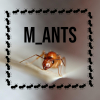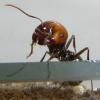Edited by M_Ants, April 22 2022 - 4:11 PM.
- Formiculture.com
- Forums
- Gallery
- Members
- Member Map
- Chat

Edited by M_Ants, April 22 2022 - 4:11 PM.
Veromessor pergandei
Veromessor andrei
Crematogaster sp.
Pogonomyrmex cf cali and rugosus
Various Pheidole
C. yogi
Perhaps a variety in the sugar diet would help. I use hummingbird nectar as well, but I also supplement the sugar supply every couple weeks with organic fruits and sugar/honey water. Varying the protien source might help as well.
Leave the Road, take the Trails - Pythagoras
Utah Ant Keeping --- Here
DIY Formicariums and Outworlds --- Here
Honeypot Ant Journal --- Here
Photo Album --- Here
Videos --- Here
UtahAnts, on 23 Apr 2022 - 12:57 AM, said:
Perhaps a variety in the sugar diet would help. I use hummingbird nectar as well, but I also supplement the sugar supply every couple weeks with organic fruits and sugar/honey water. Varying the protien source might help as well.
It would probably be beneficial but I don't think a lack of variety would cause the issues I'm having.
Veromessor pergandei
Veromessor andrei
Crematogaster sp.
Pogonomyrmex cf cali and rugosus
Various Pheidole
C. yogi
What is hydration like, I have found humidity to be a key factor in leading to some of my colonies deaths or die offs.
ZTYguy, on 23 Apr 2022 - 06:47 AM, said:
What is hydration like, I have found humidity to be a key factor in leading to some of my colonies deaths or die offs.
Well using the romanei as an example, I kept them in a test tube then moved them to a formiquarium that I kept moist.
ANTdrew, on 23 Apr 2022 - 11:17 AM, said:
A variety of proteins is very important. It’s less important for the sugars, but you could try mixing it up.
They stop caring about food once the issue starts. Doesn't matter what I feed them.
Veromessor pergandei
Veromessor andrei
Crematogaster sp.
Pogonomyrmex cf cali and rugosus
Various Pheidole
C. yogi
Based on the behavior of the romanei, I'm fairly certain they're being poisoned somehow.
Veromessor pergandei
Veromessor andrei
Crematogaster sp.
Pogonomyrmex cf cali and rugosus
Various Pheidole
C. yogi
ANTdrew, on 24 Apr 2022 - 12:01 AM, said:
To be honest, a lot of Formicines simply do not do well in captivity, Camponotus especially so. I mostly just focus on Myrmicines because they kick butt in captivity. Stick to Myrmicines, I say.
This certainly seems true in my case. I'm mostly trying to solve this problem because I have some C. yogi that I really love and I would be devastated if this happened to them.
Veromessor pergandei
Veromessor andrei
Crematogaster sp.
Pogonomyrmex cf cali and rugosus
Various Pheidole
C. yogi
I've heard of perky hummingbird nectar going bad/fermenting and killing colonies. I would try and different sugar source like byformica sunburst, fruits, etc.
Currently kept species
L. neoniger, P. occidentalis, C. modoc, C. novaeboracensis, C. vicinus, T. immigrans, A. occidentalis, S. molesta, P. imparis, M. kennedyi, M semirufus, F. pacifica, P. californica, M. ergatogyna.
Previously kept species
T. rugatulus, B. depilis.
Looking for
Myrmecocystus pyramicus, Myrmecocystus testaceus
Pheidole creightoni, Pheidole inquilina, Crematogaster coarctata, Crematogaster mutans
TacticalHandleGaming, on 24 Apr 2022 - 03:40 AM, said:
I've heard of perky hummingbird nectar going bad/fermenting and killing colonies. I would try and different sugar source like byformica sunburst, fruits, etc.
I use the powered stuff so I don't make large batches
Veromessor pergandei
Veromessor andrei
Crematogaster sp.
Pogonomyrmex cf cali and rugosus
Various Pheidole
C. yogi
TacticalHandleGaming, on 24 Apr 2022 - 03:40 AM, said:
I've heard of perky hummingbird nectar going bad/fermenting and killing colonies. I would try and different sugar source like byformica sunburst, fruits, etc.
Quite the opposite in my experience. I have had my bottle open for over a year unrefrigerated and it has never let me down. Does the powdered nectar you use have preservatives? If not I would suspect spoiled nectar to be the cause of your issues via bacterial/fungal infection
UrbanOrganisms, on 24 Apr 2022 - 04:06 AM, said:
TacticalHandleGaming, on 24 Apr 2022 - 03:40 AM, said:
Quite the opposite in my experience. I have had my bottle open for over a year unrefrigerated and it has never let me down. Does the powdered nectar you use have preservatives? If not I would suspect spoiled nectar to be the cause of your issues via bacterial/fungal infectionI've heard of perky hummingbird nectar going bad/fermenting and killing colonies. I would try and different sugar source like byformica sunburst, fruits, etc.
Veromessor pergandei
Veromessor andrei
Crematogaster sp.
Pogonomyrmex cf cali and rugosus
Various Pheidole
C. yogi
I see, so that's likely not it. Regarding protein, fruit flies is their only source of it? How often and many are you feeding? I find it hard to keep up with any species' protein demands past the founding stage using only fruit flies given how small they are. Regardless though, I don't think that explains your ants' behavior. Protein starved colonies just don't develop brood, but they don't just die. Are all your colonies essentially in a tub and tubes setup?
UrbanOrganisms, on 24 Apr 2022 - 04:19 AM, said:
I see, so that's likely not it. Regarding protein, fruit flies is their only source of it? How often and many are you feeding? I find it hard to keep up with any species' protein demands past the founding stage using only fruit flies given how small they are. Regardless though, I don't think that explains your ants' behavior. Protein starved colonies just don't develop brood, but they don't just die. Are all your colonies essentially in a tub and tubes setup?
Veromessor pergandei
Veromessor andrei
Crematogaster sp.
Pogonomyrmex cf cali and rugosus
Various Pheidole
C. yogi
I think I may have experienced what you're talking about. Last year I had a CA02 colony in a tubs and tube setup. They were doing well at first but eventually the workers just started acting strange and not really eating either, and all eventually died including the queen. I've never had this happen in any other sort of nest, so my only suspicion is that after a while the water reservoir may grow bacteria, and if the ants drink that water they get poisoned. It would explain why it happens randomly, as it would be a matter of when the bacteria begins growing in the tube.
UrbanOrganisms, on 24 Apr 2022 - 04:26 AM, said:
I think I may have experienced what you're talking about. Last year I had a CA02 colony in a tubs and tube setup. They were doing well at first but eventually the workers just started acting strange and not really eating either, and all eventually died including the queen. I've never had this happen in any other sort of nest, so my only suspicion is that after a while the water reservoir may grow bacteria, and if the ants drink that water they get poisoned. It would explain why it happens randomly, as it would be a matter of when the bacteria begins growing in the tube.
Veromessor pergandei
Veromessor andrei
Crematogaster sp.
Pogonomyrmex cf cali and rugosus
Various Pheidole
C. yogi
All your parameters seem good, and in general weird behavior is typically associated with some sort of poisoning. I would bet on the water thing. I am not a fan of tubs and tubes setup, not saying they don't work but just not my style
UrbanOrganisms, on 24 Apr 2022 - 04:32 AM, said:
All your parameters seem good, and in general weird behavior is typically associated with some sort of poisoning. I would bet on the water thing. I am not a fan of tubs and tubes setup, not saying they don't work but just not my style
Veromessor pergandei
Veromessor andrei
Crematogaster sp.
Pogonomyrmex cf cali and rugosus
Various Pheidole
C. yogi
Ant Keeping →
General Ant Keeping →
EMERGENCY! UNKNOWN FLY COCOONS IN TEST TUBE, QUEEN ANTS DYINGStarted by AntBooper600 , Jun 14 2024 |
|

|
||
Ant Keeping →
General Ant Keeping →
Help solve a mystery? Why is the Queen is DEAD!?Started by Ozymataz , Jun 25 2021 |
|

|
||
Ant Keeping →
General Ant Keeping →
Mysterious death within first 48 hours of two Lasius interjectus founding queensStarted by drawpositive , Jun 16 2021 |
|

|
||
Ant Keeping →
General Ant Keeping →
Experience with Camponotus queen - Sudden DEATH!Started by kgollehon , Feb 3 2020 |
|

|
||
Ants & Myrmecology →
General →
Camponotus Nanitic Death, Odd behaviors?Started by Derek451 , Jul 16 2019 |
|

|
0 members, 1 guests, 0 anonymous users